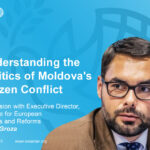Georgia, which has been hailed for its democratic development during in the post-Soviet era, began to experience a renewed political crisis following the October parliamentary elections. The Georgian Dream political party gained the greatest number of votes, however various opposition parties banded together under the United Opposition, and ultimately did not recognize the results of the election, leading to a boycott of parliament. After several months of deadlock, tensions reached a new level with the arrest of opposition leader Nika Melia. Protests erupted, with demonstrators calling for a release of political prisoners and early parliamentary elections.
After this escalation, European Council President Charles Michel stepped in and began mediation efforts between the ruling party and the opposition in early March 2021. Following the first round of negotiations, Georgian Dream and the United Opposition agreed to a six-point agenda for continued negotiations.
Less than a week after the talks, an audio recording from 2017 of Bera Ivanishivili was leaked, reigniting the tensions and the controversy surrounding the Georgian Dream party. In the recording, Bera, the son of the Georgian Dream party’s founder Bidzina Ivanishvili, is heard instructing high ranking government officials to harass various young people who made online posts criticizing him and his family. The leak of this recording put Georgian Dream led many Georgians to question the legitimacy of the party, and an investigation was called for.
This week, Special Representative of the President of the European Council Christian Danielsson held a new round of talks in Tbilisi. On March 30, Danielsson issued his proposals for resolving the domestic crisis to the ruling and opposition parties. Although Danielsson prefaced the meeting with the need for compromise, neither side agreed to sign the agreement, which called for reforms in the electoral system, judicial system, and system of power distribution.
Shortly after midnight on March 31, it was publicly announced that the mediation effort had failed. By April 1, Prime Minister Irakli Garibashvili stated in a government meeting that Georgian Dream is considering ending negotiations with the opposition, calling the negotiations ‘pointless talks.’
With the news that the political deadlock would continue, several western governments issued their own announcements showing disdain for the sustained impasse. In a joint statement issued by Members of the European Parliament, representatives warned that the absence of a resolution would affect the future relations of the European Union and Georgia. The European Parliament is currently posturing itself to suspend financial assistance to Georgia through various programs; the amount to be withheld amounts to approximately 60 million Euros.
In a recently published report by the U.S. Department of State, the U.S. reiterated the opinion of the OSCE and ODIHR. The OSCE and ODIHR assessment states that there are questions over abuse of administrative resources, intimidation of voters, violations of voter secrecy, attacks on political opponents, and violence against journalists.
As Georgia’s internal political crisis continues, the lack of a complete parliament has implications for relations and negotiations with Abkhazia and South Ossetia, internationally recognized as part of Georgia, but controlled by occupying governments and supported by the Russian government.
While Russia has stated that it is staying neutral on the Georgian crisis, Russia is known to capitalize on division. Georgia’s political parties often accuse each other of having relations, or a desire to have relations, with Russia. Majority of Georgians consider integration with Europe as a way of protecting the country from further occupation of territories by Russia. However, with relations between Georgian political parties and European Union officials strained, Russia can exploit the growing distance between the E.U. and Georgia. With a disruption to the construction of Euro-Atlantic relations, Georgia may be less likely to defend itself against ‘borderization’ efforts of Russian forces, and it may be less capable of engaging in meaningful negotiations with Abkhaz and South Ossetian officials.
Russia can take advantage of Georgia’s weakness and make additional efforts to integrate Abkhazia and South Ossetia with itself, politically and economically. In this capacity, Abkhaz Vice President Aslan Bartsits stated in a recent interview that ‘negotiations with Tbilisi are an illusion.’ Bartsits stated that, “we are in a state of war with Georgia. We have no peace treaty. Georgia’s rhetoric towards Abkhazia has not changed one iota.”
The Russian Federation is one of few countries recognizing Abkhazia’s independence, and the Georgian government is in no position to encourage Abkhaz officials to engage in talks. For the time being, Abkhazia will continue to rely on Russia for connection to the outside world, deepening investments in infrastructure and trade, further isolating Abkhazia from Georgia. As long as the Georgian political crisis continues, negotiations and communications with its occupied territories will be off the table, negating any progress that has been made in improving relations in recent years.

